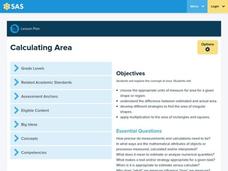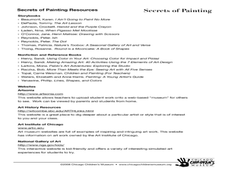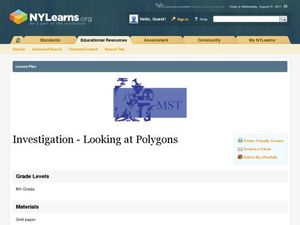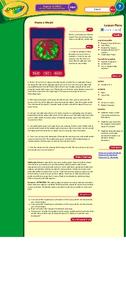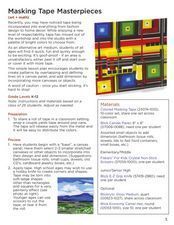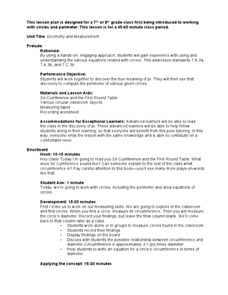Pyro Innovations
Get into Shape
Shapes are so fun! Little ones explore, identify, and create shapes using tangrams or pattern blocks. The activity is intended to stimulate critical thinking while engaging learners through play and shape identification. Each child will...
Curated OER
What Shapes Can You See?
Students investigate shapes in art. In this visual arts lesson, students examine the ancient Panamanian "Plaque" and identify the geometric shapes in the art piece. Students combine basic shapes to make an artistic picture of their own.
Virginia Department of Education
Order Up!
Order in the math class! Scholars learn to evaluate expressions using the order of operations. A game has them rolling number cubes to determine numbers to use when evaluating.
Pennsylvania Department of Education
Multiplication Using Arrays
Explore the concept of multiplication by using arrays. Classmates use arrays to gain a better understanding of multiplication. They break arrays apart to model the distributive property of multiplication over addition. The relationship...
Alabama Learning Exchange
Polygon Perimeters
What are polygons? Learners find the perimeter of various geometric figures that the teacher has drawn in chalk on the sidewalk. A worksheet to record their measurements is provided. Get your third graders outside and exploring the world...
Curated OER
Line and Shading = Shape and Form
Students collect natural objects and draw these objects with and without shading.
Curated OER
Which container holds a larger amount of popcorn?
What does popcorn have to do with math? Seventh grade mathematicians are provided an opportunity to develop a conceptual understanding of the formula for volume and to use it as a tool to solve problems. The lesson begins with a...
Curated OER
Line: a Geometric Exercise
Students study the different types of lines and create a drawing demonstrating what they learned.
Curated OER
ExplorA-Pond:3rd Grade Shapes & Fractions
Students, using a map, drawing or aerial view of a pond, represent the shape of the pond using simple geometric shapes or fractions of those shapes. They identify the numerator and denominator in each fraction created.
Pennsylvania Department of Education
Making Cubes
Third graders explore vocabulary associated with three dimensional figures. In this transformations lesson, 3rd graders create two dimensional nets for three dimensional figures. Students become familiar with describing two...
Pennsylvania Department of Education
A Geometric Scavenger Hunt
Fifth graders connect their knowledge of polygons and polyhedrons. In this geometric shapes instructional activity, 5th graders identify and classify two- and three-dimensional objects. Students construct a polyhedron out of polygons and...
Curated OER
Quadrilaterals: Four-sided Figures
Fifth graders engage in a variety of hands-on and technology-rich activities involving the classification of quadrilaterals. They utilize protractors and rulers to investigate the characteristics of various types of quadrilaterals. They...
Curated OER
Secrets of Painting
Young scholars explore colors and shapes. In this art concepts lesson, students discuss shapes, lines, and color while creating a variety of abstract designs. The instructions for several art activities are provided. Basic art vocabulary...
NY Learns
Investigation - Looking at Polygons
Middle schoolers construct polygons by plotting points on a coordinate plane. Pupils connect the points and identify which polygons they have drawn. They will need graph paper to carry out the assigned activities. A vocabulary list,...
Curated OER
Solving Applications Using Quadratic Equations
In this solving applications worksheet, learners translate word problems to number sentences. They solve the created quadratic equation. This three-page worksheet contains 12 problems.
Curated OER
Pythagorean Theorem by Graphic Manipulation
There are many different ways to show a proof of the Pythagorean Theorem. Here is a nice hands-on paper cutting activity that shows a graphic representation. You can even challenge your young Pythagoreans to come up with their own...
Illustrative Mathematics
Toilet Roll
Potty humor is always a big hit with the school-age crowd, and potty algebra takes this topic to a whole new level. Here the class develops a model that connects the dimensions (radii, paper thickness, and length of paper) of a...
Curated OER
Weave a Wreath
Students follow directions to complete a multi-step process that results in an attractive holiday decoration. In this Christmas art activity lesson, students employ simple measuring and weaving techniques and experiment with the negative...
Curated OER
Orbital path of Landsat
Students comprehend how Landsat satellites orbit teh Earth to produce images. They comprehend the elliptical path of satellites. Students recognize that a different orbital path is needed for different satellites to perform their tasks....
Curated OER
Masking Tape Masterpieces
Learners create non-objective art based on the design elements of line, color, balance and movement using tape. This simple lesson plan encourages students to create patterns by overlapping and defining lines on a canvas panel. One of...
Curated OER
Geometry and Measurement
Students view a right triangle displayed by the teacher. Students measure legs and the interior angles of the triangle. They look for a pattern or relationship between the legs and angles. Students use pegboards and string to create more...
Curated OER
Algebra I: Multiplying Polynomials and Factoring
Students use concrete models (algebra blocks) to demonstrate their processes for solving quadratic equations. They apply the commutative, associative, and distributive properties to simplify algebraic expressions and to solve quadratic...
Curated OER
Let's Talk About Painting
Second graders identify the elements of the arts. For this visual arts lesson, 2nd graders read the book Matthew's Dream and discuss the elements of the arts. Students create their own paintings according to the style of specific artists.
Curated OER
Life Size Characters
Sixth graders analyze character traits and create a life size character outline. In this character analysis lesson, 6th graders analyze character traits of a character using character webs and poems. Students then create a life size...



